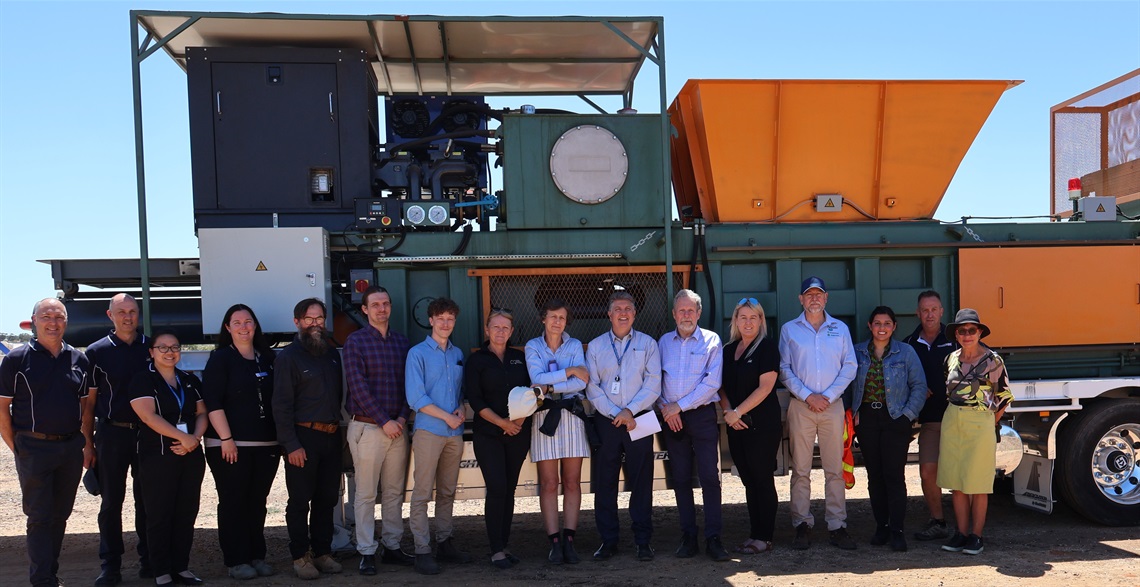
Swan Hill Rural City Council officially launched the Circular Agricultural Plastics Economy (CAPE) baler project at the Swan Hill Landfill site on Wednesday, 20 November.
This project is supported by the Circular Economy Councils Fund. The Fund is delivered by Sustainability Victoria (SV) under the Victorian Government's circular economy policy, Recycling Victoria: a new economy.
Council's Chief Executive Officer, Scott Barber explained the significance of the project for the region.
"This initiative marks a significant step forward in our collective efforts to create a more sustainable future for agriculture and waste management in the Loddon Mallee region," he said.
Mr Barber explained that the disposing of agricultural plastics is one of this region's most pressing challenges.
"Recent studies by RMCG revealed that our Loddon Mallee region is Australia's largest producer of agricultural plastic waste, generating an estimated 10,000 tonnes annually, which could fill approximately eight Olympic-sized swimming pools."
"This volume underscores the urgent need for innovative approaches to waste management. With the support of Sustainability Victoria and funding of $330,000 from the Circular Economy Councils Fund, along with a co-contribution from Council, we are proud to lead the charge in addressing this issue," said Mr Barber.
Representatives from Sustainability Victoria, Australian Table Grapes Association, Agsafe, Buloke Shire Council, Mildura Rural City Council and the Swan Hill Residents and Ratepayers Association attended the launch.
Tim McIntosh-Hannah from SV, praised Swan Hill Rural City Council's commitment to sustainability. He noted that along with the CAPE Baler Project, SV has funded two other initiatives under the Circular Economy Councils Fund in Swan Hill – a Mattress Processing and Recycling Project and an Organics Processing Facility in Ultima.
"We congratulate the Council on taking a leading role in building circular economy capacity in the region. Projects like the CAPE baler provide opportunities for jobs, growth and increased productivity by realising the potential of recovered resources and their contribution to a cleaner, more resilient regional economy" he said.
David Leitch, Program Manager of the Agsafe bagMUSTER initiative, was thrilled to attend the official launch of the CAPE baler project. He explained that Agsafe is hoping to collaborate with Swan Hill Rural City Council and SV as they prepare to commence stage one trial of their bagMUSTER program in early 2025.
"Agsafe have chosen to start stage one of the bagMUSTER trial in Victoria because SV is at the forefront of soft plastic recycling. We hope to join forces with Swan Hill Rural City Council to collect and bale soft plastics throughout the region," he said.
Mr. Barber explained that Council recently conducted a successful CAPE bale project trial in the municipality, which involved the collection of specific soft plastic items including table grape covers, grain tubes, silo bags, and tunnel film.
"The response from the agricultural sector was overwhelming. Pleasingly, we diverted 12 tonnes of agricultural plastic waste from going to landfill.
"Since the trial concluded, we have collected an additional 20 tonnes of grain bags and cover plastics. It is truly satisfying to see this initiative so well received by our agricultural community," noted Mr Barber.
The equipment funded by this project delivered by Sustainability Victoria under the Victorian Government's circular economy policy, Recycling Victoria: a new economy in partnership with Swan Hill Rural City Council, enables the baling of soft plastics, allowing them to be transported to facilities where they are repurposed into products such as fence posts, irrigation pipes, and other essential farming tools.






